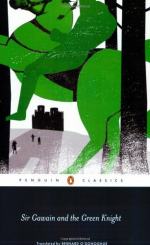|
|
Sir Gawain and the Green Knight Part 2, lines 491-810
The poet says that the Green Knight began Arthur's New Year the way he liked it: with marvelous things. The Knights of the Round Table, however, sat silent and grim at their food after the Green Knight had left.
The poet then relates the passing of the next year. Each season raced one after the other, he says: after Christmas came and uncomfortable Lent of simple food and fish, then the passing of winter into the warm showers and blossoming flowers of spring, then the birds singing like angels for the coming of summer. And summer gives way to the harvest and the winds of autumn, and the leaves lie dead on the ground and the fruit ripens and rots, and finally the winter winds return, reminding Sir Gawain of his promise to the Green Knight.
Gawain stayed in Arthur's court until All-Saints day, when Arthur held a feast in Gawain's honor in preparation for his journey. The Knights and Ladies of the Round Table laughed and drank to Gawain, while all the while deep in their hearts they felt gray and cold. And Gawain, at the end of the feast, approached Arthur and begged his leave of the court. The best of Arthur's knights came to Gawain to counsel him with heavy hearts - Iwain, Eric, Sir Dodinel de Sauvage, the Duke of Clarence, Lancelot, Lionel, Lucan the Good, Sir Bors, Sir Bedivere, and Mador de la Port. And although they lamented that so good a man as Gawain should have to bow to such a request, Gawain smiled at them, saying that he should not waste his time with fear, for it was time for fate to take its course.
Gawain slept that night and rose at dawn the next morning and called for his armor, which was laid out for him gleaming of a rich red rug. Over a doublet of Tharsia silk, tied at the hood, he fastened a hood lined with fur. Steel shoes were put on his feet, legs were wrapped in hinged metal with polished knee plates, thick thigh plates were fastened, and a mail shirt, woven like silk, was put on his chest. Then arm pieces, with bent elbow joints, and steel gloves, golden spurs, a good sword, and a sash completed the outfit. In his armor, Gawain stood for mass, then took leave of the lords and ladies. He walked to Gringolet, his horse, which stood gleaming in its armor, and he lifted his lined helmet and kissed it. Clasped behind the helmet on the neckband was delicately embroidered silk, decorated with jewels and parrots stitched between painted purple flowers. Around the helmet on top was a ring of diamonds in a magic knot. Gawain's shield was carried in, striped with bright red. A pentangle star was painted in gold at its center, five triangles enfolding one another, known in England as the "infinite knot," and symbolizing truth. Gawain, the poet says, wears this symbol by right, for he is a noble knight, and pure as gold. Just like the pentangle, Gawain's five senses were free of sin, his five fingers never failed him, and all of his earthly hope was contained in Christ's five wounds on the cross. And when he was faced with battle, Gawain's mind was fixed on the five joys which Mary had of Jesus, and thus he had her face painted on the inside of the shield, to keep his mind on heaven's queen. The poet says that Gawain possessed five virtues that made him a noble knight - love and friendship for other men, freedom from sin, courtesy that never failed, and pity.
"And all these fives met in one man,
Joined to each other, each without end,
Set in five perfect points
Wholly distinct, yet part of one whole
And closed, wherever it end or begin.
And so the pentangle glowed on his shield,
Bright red gold across bright red stripes,
The holy pentangle, as careful scholars
Call it." Part 2, lines 656-665
Gawain, ready, spurred his horse and rode away. Arthur's court watched and sighed, as all of Camelot was sad at his fate and lamented what they assumed to be his coming death.
Gawain rode through England on God's behalf, and he met with many perils. He was often alone at night, and saw no one but his horse in the day, until he reached northern Wales. There he landed in the Wirral Forest, where the poet says that few good men lived. But he asked all he saw if they knew of the Green knight, or the Green Chapel, and everyone he asked said that no, they had never heard of such a man. At every stream Gawain found foul enemies with whom he was forced to fight. He found dragons, and wolves, and satyrs, and forest trolls, and bulls, and bears, and boars, and giant ogres. And Gawain was save from them by his strength, his courage, and his faith in God. He slept in his armor, in the frozen rain, exposed on open rock. And Gawain rode until Christmas eve, when he prayed to Mary to grant him reprieve.
In the morning he rode down into a wild oak forest, suddenly afraid that he would not be able to hear a Christmas mass to honor Jesus' birth. He prayed to God and to Mary that he would find some lodging, and hear mass. And as he rode, he prayed and wept for his misdeeds, and three times made the shape of the cross, calling out to Christ.
Suddenly, on a hill, Gawain saw a castle, the loveliest he had ever seen. He removed his helmet and gave thanks to Jesus and Julian, the patron of travelers. He spurred Gringolet and approached the castle bridge. He called, and a porter appeared, standing on the castle wall and greeted the knight.




